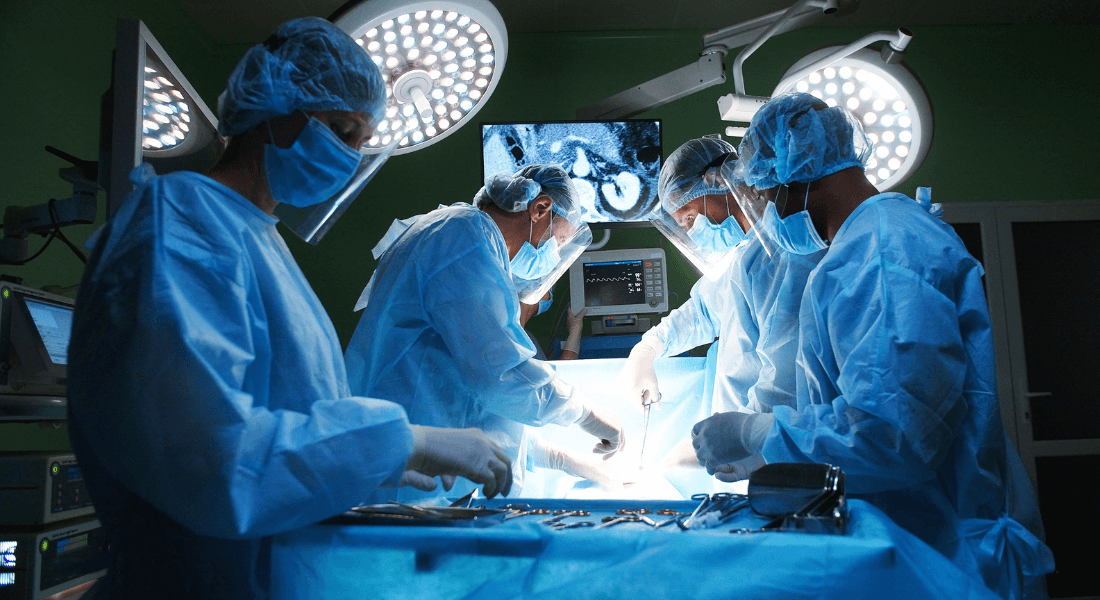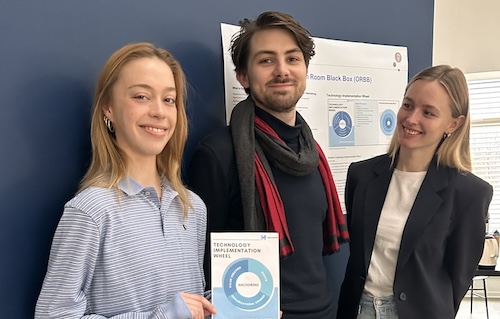Communication transforms surveillance into quality control
Surgery could be safer if surgical theatres were monitored as systematically as other high-risk industries. Hospital staff do want to improve for the safety of patients but dislike the feeling of an Orwellian Big Brother watching over them. Students at University of Copenhagen analysed the adoption of an AI-backed tracking system recently installed by university hospital Rigshospitalet.

News story produced by Copenhagen Science City
For every seven operations in Denmark, at least one leads to complications. Often due to what doctors and nurses do- or do not do- during surgery. This is why Rigshospitalet installed the tracking system “Operating Room Black Box” from Canadian company Surgical Safety Technologies. A group of University of Copenhagen-students prototyped a communication tool in conversation with six members of surgery staff and management as a case-study in their education in concept development and innovation.
- Management would talk about the system as tracking, while staff frequently called it surveillance. It is vital to staff, to feel informed about who sees the videos and what the data will be used for. A lot of them wanted reassurance that it could be used seek out and repair structural and organisational obstacles to improving patient safety, says Feliz Bloch, student, Communication and IT, University of Copenhagen.

The student team looking at Operation Room Black Box were Andreas Maina Jørgensen, August Maigaard Rubin, Allberte Villefrance, and Feliz Bloch. They were supervised by Associate Professor Naja Holten Møller from the Department of Computer Science. On the photo is Feliz, August, and Allberte.
Operation Room Black Box is a camera system, where footage is sent to Canada for analysis by a trained Artificial Intelligence. Supposedly this makes data anonymous, but the students found, that staff were unconvinced. They felt a lack of clear answers and did not have neither time nor inclination to seek information in a stressed workday.
- Our first prototype of the conversation tool was really just a piece of printed cardboard with space for post-it notes. This allowed our interviewees to participate in the design of the tool. It also allowed us to discover that almost all mistrust in Operation Room Black Box came from a perceived lack of communication. Our final prototype will be a printed flyer with conversation starters and other involvement tools. With minor customisation we hope that our solution could help adoption and acceptance of most tracking technologies in complex organisations like Rigshospitalet, says Allberte Villefrance, student, Communication and IT, University of Copenhagen.
The value in adopting tech solutions
Communication and IT is a cross-disciplinary programme taught by tutors from Humanities and Computer Science, both at University of Copenhagen. The course “Concept development and Innovation” is specifically aimed at ensuring that new technology creates value for its users. Every course ends with a case-study, where students get to use their new-found skills with actual users.
- There is a lot of good tech out there, but it does no good whatsoever, if no-one wants to use it. We train our students to become bridgebuilders. If they can help potential users see the value in the tech, the road to adoption becomes that much shorter, says Naja Holten Møller, Associate professor, Department of Computer Science, University of Copenhagen.
At Rigshospitalet, OR Black Box has been in operation since 2020 and has tracked over 700 operations. Apart from improving patient safety, the hope here is also, that video monitoring will help young surgeons learn their craft faster by video-analysing their work. Much like elite athletes have been doing for years.
- We see so many advantages to video-tracking with OR Black Box in operating rooms, so acceptance among staff is absolutely vital. I am impressed that students at the University of Copenhagen were capable of pinpointing some of the main obstacles to adoption of this technology, and even more so, that they have come up with a possible solution in just a few weeks, says Jeanett Strandbygaard, Consultant OBGYN, Associate Professor, Project lead OR Black Box Rigshospitalet.
Contact
Naja Holten Møller
Associate Professor
Department of Computer Science, University of Copenhagen
naja@di.ku.dk
